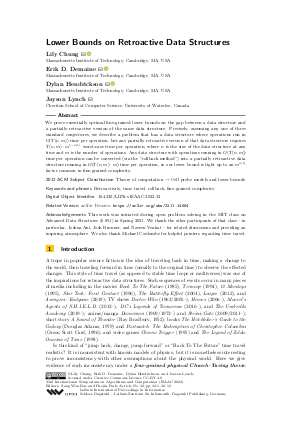Lower Bounds on Retroactive Data Structures
Authors
Lily Chung  ,
Erik D. Demaine
,
Erik D. Demaine  ,
Dylan Hendrickson
,
Dylan Hendrickson  ,
Jayson Lynch
,
Jayson Lynch
-
Part of:
Volume:
33rd International Symposium on Algorithms and Computation (ISAAC 2022)
Part of: Series: Leibniz International Proceedings in Informatics (LIPIcs)
Part of: Conference: International Symposium on Algorithms and Computation (ISAAC) - License:
 Creative Commons Attribution 4.0 International license
Creative Commons Attribution 4.0 International license
- Publication Date: 2022-12-14
File

PDF
LIPIcs.ISAAC.2022.32.pdf
- Filesize: 0.76 MB
- 12 pages
Document Identifiers
Related Versions
- arXiv Version https://arXiv.org/abs/2211.14664
Subject Classification
ACM Subject Classification
- Theory of computation → Cell probe models and lower bounds
Keywords
- Retroactivity
- time travel
- rollback
- fine-grained complexity
Metrics
- Access Statistics
-
Total Accesses (updated on a weekly basis)
0PDF Downloads0Metadata Views
Abstract
We prove essentially optimal fine-grained lower bounds on the gap between a data structure and a partially retroactive version of the same data structure. Precisely, assuming any one of three standard conjectures, we describe a problem that has a data structure where operations run in O(T(n,m)) time per operation, but any partially retroactive version of that data structure requires T(n,m)⋅m^{1-o(1)} worst-case time per operation, where n is the size of the data structure at any time and m is the number of operations. Any data structure with operations running in O(T(n,m)) time per operation can be converted (via the "rollback method") into a partially retroactive data structure running in O(T(n,m)⋅m) time per operation, so our lower bound is tight up to an m^o(1) factor common in fine-grained complexity.
Cite As Get BibTex
Lily Chung, Erik D. Demaine, Dylan Hendrickson, and Jayson Lynch. Lower Bounds on Retroactive Data Structures. In 33rd International Symposium on Algorithms and Computation (ISAAC 2022). Leibniz International Proceedings in Informatics (LIPIcs), Volume 248, pp. 32:1-32:12, Schloss Dagstuhl – Leibniz-Zentrum für Informatik (2022)
https://doi.org/10.4230/LIPIcs.ISAAC.2022.32
BibTex
@InProceedings{chung_et_al:LIPIcs.ISAAC.2022.32,
author = {Chung, Lily and Demaine, Erik D. and Hendrickson, Dylan and Lynch, Jayson},
title = {{Lower Bounds on Retroactive Data Structures}},
booktitle = {33rd International Symposium on Algorithms and Computation (ISAAC 2022)},
pages = {32:1--32:12},
series = {Leibniz International Proceedings in Informatics (LIPIcs)},
ISBN = {978-3-95977-258-7},
ISSN = {1868-8969},
year = {2022},
volume = {248},
editor = {Bae, Sang Won and Park, Heejin},
publisher = {Schloss Dagstuhl -- Leibniz-Zentrum f{\"u}r Informatik},
address = {Dagstuhl, Germany},
URL = {https://drops.dagstuhl.de/entities/document/10.4230/LIPIcs.ISAAC.2022.32},
URN = {urn:nbn:de:0030-drops-173171},
doi = {10.4230/LIPIcs.ISAAC.2022.32},
annote = {Keywords: Retroactivity, time travel, rollback, fine-grained complexity}
}
Author Details
Acknowledgements
This work was initiated during open problem solving in the MIT class on Advanced Data Structures (6.851) in Spring 2021. We thank the other participants of that class - in particular, Joshua Ani, Josh Brunner, and Naveen Venkat - for related discussions and providing an inspiring atmosphere. We also thank Michael Coulombe for helpful pointers regarding time travel.
References
- Scott Aaronson, Mohammad Bavarian, and Giulio G. Giusteri. Computability theory of closed timelike curves. Technical Report TR16-146, Electronic Colloquium on Computational Complexity, 2016. URL: https://eccc.weizmann.ac.il/report/2016/146, URL: http://arxiv.org/abs/TR16-146.
-
Ilya Baran, Erik D. Demaine, and Mihai Pǎtraşcu. Subquadratic algorithms for 3SUM. Algorithmica, 50(4):584-596, 2007.

- Harry Buhrman, Subhasree Patro, and Florian Speelman. A framework of quantum Strong Exponential-Time Hypotheses. In Markus Bläser and Benjamin Monmege, editors, Proceedings of the 38th International Symposium on Theoretical Aspects of Computer Science, volume 187 of LIPIcs, pages 19:1-19:19, 2021. URL: https://doi.org/10.4230/LIPIcs.STACS.2021.19.
-
Lijie Chen, Erik D. Demaine, Yuzhou Gu, Virginia Vassilevska Williams, Yinzhan Xu, and Yuancheng Yu. Nearly optimal separation between partially and fully retroactive data structures. In Proceedings of the 16th Scandinavian Symposium and Workshops on Algorithm Theory, pages 33:1-33:12, Malmö, Sweden, June 2018.

-
Erik D. Demaine, John Iacono, and Stefan Langerman. Retroactive data structures. ACM Transactions on Algorithms, 3(2): Article 13, May 2007.

-
Erik D. Demaine, Tim Kaler, Quanquan Liu, Aaron Sidf ord, and Adam Yedidia. Polylogarithmic fully retroactive priority queues via hierarchical checkpointing. In Proceedings of the 14th International Symposium on Algorithms and Data Structures, pages 263-275, Victoria, Canada, August 2015.

-
James R. Driscoll, Neil Sarnak, Daniel D. Sleator, and Robert E. Tarjan. Making data structures persistent. Journal of Computer and System Sciences, 38(1):86-124, 1989.

- Ari Freund. Improved subquadratic 3SUM. Algorithmica, 77(2):440-458, 2017. URL: https://doi.org/10.1007/s00453-015-0079-6.
-
Anka Gajentaan and Mark H. Overmars. On a class of O(n²) problems in computational geometry. Computational Geometry: Theory and Applications, 5(3):165-185, 1995.

- Yoav Giora and Haim Kaplan. Optimal dynamic vertical ray shooting in rectilinear planar subdivisions. ACM Transactions on Algorithms, 5(3): Article 28, July 2009. URL: https://doi.org/10.1145/1541885.1541889.
- Allan Grønlund and Seth Pettie. Threesomes, degenerates, and love triangles. Journal of the ACM, 65(4):22:1-22:25, 2018. URL: https://doi.org/10.1145/3185378.
-
Monika Henzinger, Sebastian Krinninger, Danupon Na Nongkai, and Thatchaphol Saranurak. Unifying and strengthening hardness for dynamic problems via the online matrix-vector multiplication conjecture. In Proceedings of the 47th Annual Symposium on the Theory of Computing, pages 21-30, Portland, OR, June 2015.

-
Russell Impagliazzo, Ramamohan Paturi, and Francis Zane. Which problems have strongly exponential complexity? Journal of Computer and System Sciences, 63(4):512-530, 2001.

-
Virginia Vassilevska Williams. On some fine-grained questions in algorithms and complexity. In Proceedings of the International Congress of Mathematicians, pages 3447-3487, Rio de Janeiro, Brazil, 2018. World Scientific.

